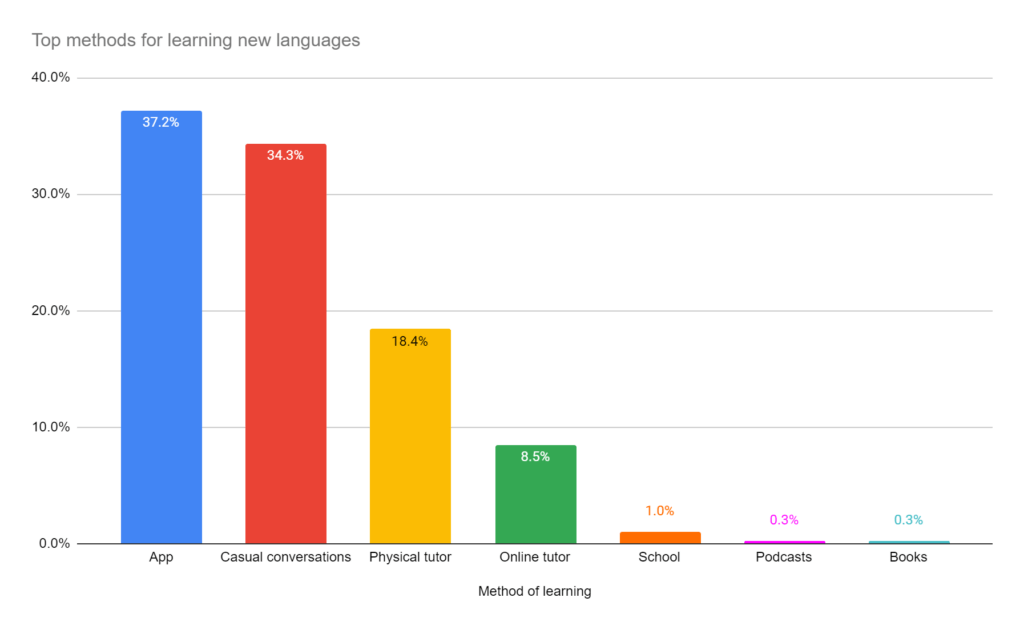Want to know if you can learn a Nigerian language online? The short answer is yes. But before you run off with that information, you should know that there are nuances to that answer.
Generally, learning a language requires a system of repetition and practice. However, the challenge with learning Nigerian languages is finding a suitable learning model with avenues for practice. But don’t worry; you’ll learn how to navigate that in this article.
Title image by ASphotofamily on Freepik
How to learn a Nigerian language online
There are over 500 Nigerian languages, most of which are not well represented in the digital space. This makes it harder to learn them online. But that doesn’t mean it’s impossible.
Here’s how you can successfully learn a Nigerian language online:
1. Find a native tutor
As indicated by a study we carried out (see the full report on indigenous Nigerian languages here), apps are the most preferred method of digital language learning.

However, apps aren’t the way to go for indigenous Nigerian languages. There are two reasons for this. First is the knowledge gap about Nigerian languages online. Generally, it’s difficult for language models to accurately translate Nigerian languages to English because the database they work with is limited.
The limited representation of Nigerian languages online is why you won’t find Nigerian languages listed on popular apps like Duolingo and Memrise. It’s also why you will find many incorrect English to Nigerian language translations from language models like Google Translate and ChatGPT.
The second reason language apps won’t work is that Nigerian languages are primarily tonal. This means that one word can have different meanings depending on its pronunciation. This makes it more difficult for learners to learn proper word pronunciation without help from native tutors.
Getting a native tutor is the best approach to learning a Nigerian language. As our survey chart shows, you can learn a language from a native via casual conversations, physical tutelage, or online tutoring.
Online language learning offers the most flexibility among the options. Here’s how we offer this service at Prepmewell Language Institute:
- You get the familiarity of casual conversations with our native tutors
- You get a proper learning structure that comes with physical tutelage
- Flexible class schedule to aid consistency
- And there’s no distance or location barrier.
Want to start learning a Nigerian language?
Please fill out this form to tell us which one you prefer, and we’ll connect you with our professional native tutors.
2. Identify your learning goals.
As you schedule a class with your native Nigerian tutor, you need to have a proper rhythm in your learning. So that when the journey gets more demanding, you have a reason to keep pushing. This starts with the question, why do you want to learn a Nigerian language?
There are no incorrect answers to this question. The reasons why people learn a new language are different. Some learn for relocation, others for business, family, culture, versatility, or recreational learning. All reasons are valid. More importantly, define your reason and keep your learning goals clear so you can measure your progress as you learn online.
Need help defining why you should learn a Nigerian language online? Read our piece on the importance of learning a second language.
3. Create a learning schedule.
After you’ve mapped out your learning goals, you need a learning schedule to help you reach your learning milestones in time. A learning schedule is essential for staying consistent with learning and keeping your language goals within reach.
To create a realistic learning timetable, you must know how long it should take to learn a Nigerian language. With PLI, we use the global CEFR language framework to create a workable learning schedule for learners to learn a Nigerian language online. At the core of our learning plans, we encourage learners to be patient. Language learning is a marathon, not a sprint.
4. Source for resources
Finding relevant learning resources isn’t always easy for Nigerian language learners. This again boils down to inadequate information on Nigerian languages in the digital space. But if you know where to look, you’ll find valuable materials to help you learn Nigerian languages online.
You can ask your tutor to share relevant language resources with you. This is a given with PLI language classes. Language learning resources can be an electronic Nigerian language dictionary, culture-rich Afrobeats songs and Nollywood movies, or appropriate YouTube videos. For example, the “#Masoyinbo” YouTube show helps learn the Yoruba language.
5. Keep constant practice
Getting better at any language requires practice—lots of practice. And practising takes intentionality. So, don’t hesitate to speak the Nigerian language you’re learning every opportunity you get. Constant practice helps sharpen your grasp of the language’s tones and nuances.
What you should know about learning a Nigerian language online

Now that you know how to learn a Nigerian language online, you must also get your facts straight concerning Nigerian languages. In this section, we will clarify some of the Western misconceptions about Nigerian languages and give you a heads-up on how to brace for some of the challenges that come with language learning.
~ Pick a language
As we mentioned earlier, there are over 500 languages in Nigeria. Nigeria is the third most linguistically diverse country in the world. So, just as many Westerners misname Africa as one country, there is no one language called the Nigerian language. The closest you will get to a general “Nigerian language” is Nigerian Pidgin English, which isn’t even one of the ancestral Nigerian languages.
If you’re fascinated with Nigerian culture or want to relate better with a Nigerian around you, find out which Nigerian language you should learn from them. The most popular languages in Nigeria are Hausa, Yoruba, and Igbo, so it’s most likely one of these three.
~ Start with the basics.
Learning a language online can be tempting, and you may want to jump the gun and learn how to speak or translate words in isolation. But that doesn’t produce fluency in the long run. If you must learn the Nigerian language’s alphabet first, be patient enough to trust the process. Your understanding of the foundations would shape how well you perform with the advanced bits of the language.
~ Find relatable topics
You can learn some everyday terms in Nigerian languages to make your learning more rewarding and engaging. These will help you communicate basic thoughts. And importantly, it will make Nigerians around you appreciate your effort and be more open to practising their language with you. Here are some terms to get you started:
- Good morning in Nigerian languages
- In Igbo – Ụtụtụ ọma
- In Yoruba – Ẹ káàrọ́ọ̀
- In Hausa – Ina kwana or Barka da safiya
- I love you in Nigerian languages
- In Igbo – A hụrụ m gị n’anya
- In Yoruba – Mo nífẹ̀ẹ́ rẹ
- In Hausa – Ina son ku
- Happy Birthday in Nigerian languages
- In Igbo – Ezi ncheta ọmụmụ
- In Yoruba – Ẹ kú ayẹyẹ ọjọ́ ìbí
- In Hausa – Barka da ranar haihuwa
~ Get familiar with the culture
Culture and language are intertwined. We can say that culture can’t thrive without language and vice versa. So, as you seek to learn a Nigerian language online, also be open to learning about the culture. For example, in the Yoruba culture, males prostrate to greet older adults.
So, as you’re learning to say good morning, you might want to know the gestures accompanying the words. Other parts of the culture in Nigerian languages include learning the titles of different kings in Nigerian languages or the names of gods in Nigerian languages.
~ Writing and reading come much later.
Reading and writing in indigenous Nigerian languages isn’t commonplace, even among natives. The reason is that the language’s tonality plays a significant role in accurately interpreting written texts. So, beginners should focus on speaking first, and at the intermediate stage, they should double down on reading and writing in Nigerian languages.
Conclusion
Learning Nigerian languages online has become easier than it used to be. Today, you can get on YouTube and gain hours of knowledge on basic conversation starters in your preferred Nigerian language. However, moving from the basics to meaningful conversations requires a guide to lead you through.
Prepmewell Language Institute is the guiding hand that you seek. Our native tutors are trained and experienced to teach languages to children, teens, and adults. Click here to read more about our online language classes.



